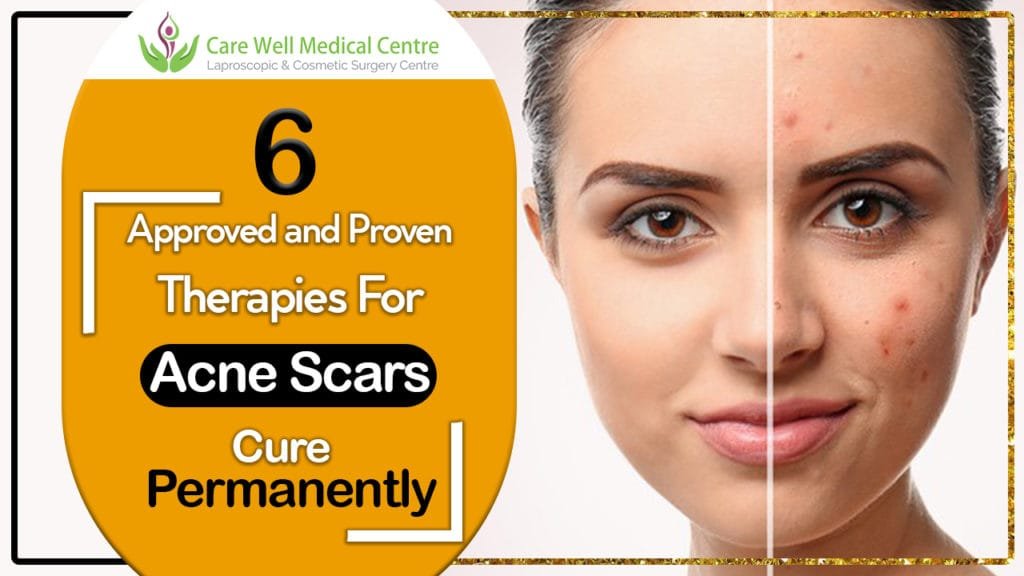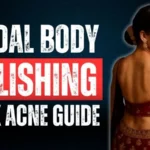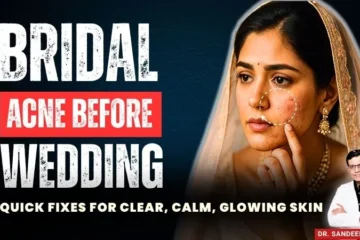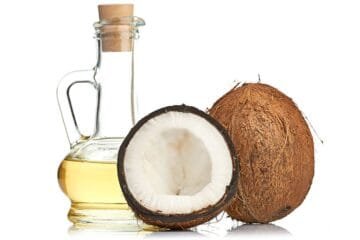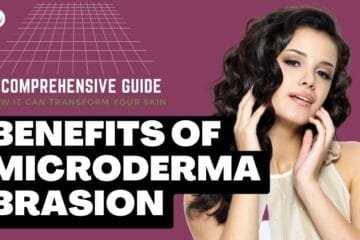When wondering how to cure acne permanently, seeking specialized care is paramount. Acne, or acne vulgaris, while often associated with adolescence, can persist into adulthood, leading to persistent scars. These scars not only diminish skin quality but can also impact self-confidence, potentially hindering career opportunities in sectors like hospitality, media, and retail. Even if your skin tone is dark, clear skin is essential. Thus, for those affected, seeking treatment from renowned skincare clinics becomes crucial. Dive into understanding acne’s causes and symptoms and discover effective remedies available in modern dermatology clinics.
What is an Acne Scar?
Acne scars are a skin disease that is more likely to be seen during puberty in males and females. It will cause the skin to turn black or white in the initial stage. It can later form a cyst and break. Most often, an acne scar is mistaken for a pimple. However, acne is present in adult people too. Therefore, one must not mistake them for puberty-related signs.
Acne may naturally appear and disappear. When they leave scars, they need treatment to bring back your beautiful skin. This will leave a scar on your facial skin, neck, and shoulder areas. He or those with too many acne scars must get skincare treatment from a reputed dermatologist in your area.
Acne Cause
The cause of acne is still under research. This is because acne is seen to continue in people around their 20s and 40s too. Therefore, it has biological and environmental causes too.
Biological
- If acne is hereditary in the family,
- Consuming more high-glycemic foods.
- puberty and increased production of sex hormones.
- Accumulation of dead skin cells.
- Smoking cigarettes and drinking alcohol
Environmental
- Wearing a helmet for a long time daily.
- Wearing a cap and hat and covered with a scarf on the head and facial area.
- Facial skin exposed to air pollution
- Not taking a daily bath or cleansing the facial area daily.
- Using excessive beauty care cosmetics
Acne Signs and Symptoms
- Spotting of whiteheads on facial, neck, and shoulder skin
- Spotting of blackheads on facial, neck, and shoulder skin
- Spotting of small, red, and tender bumps with an itching sensation
- Spotting Pimples with pus at their tips
- Spotting of large, solid nodules with pain under the surface of the facial skin
- Spotting of cystic lesions, which are painful.
Acne is also a sign of diabetes. It is often found in people who are in their 40s and have high blood sugar. Acne is also more common in people who have more toxins in their blood. This can be due to prolonged medication, the use of drugs, or tobacco products.
How to Curb Acne Scars with a Dermatologist?
Young and adult people with acne must approach a popular dermatologist. They do various lab tests and come up with the right acne scar treatment for men and women. They may do the below-mentioned therapies after checking your clinical results.
Chemical Peel
A dermatologist will perform a face peel or chemical peel based on the patient’s skin type and the severity of acne. This is one of the best ways to remove dead skin cells effectively. As part of how to cure acne permanently, the dermatologist applies an acidic solution to the facial area after cleansing the skin. This works like a face mask, which remains for 20–30 minutes. After the required time, the dermatologist removes the mask using a neutralizer, helping to rejuvenate the skin and reduce acne.
They may use a fan or ice to stop the burning sensation on your facial skin, if any. In this way, your acne scars will vanish after two or three sessions. This will also reduce acne-related, oily skin. A chemical peel is mostly recommended for people suffering from acne in the initial stage. It is not advisable to do any face peeling with citrus fruits as a home remedy. They can worsen your skin.
MNRF
MNRF, or microneedle radiofrequency, is one of the acne scar treatment options a skin care specialist will apply. This is an invasive procedure that is effective in clearing small and large acne scars. A controlled radio frequency is applied through gold-plated needles on the acne marks. They destroy the dead cells, and this helps generate new cell growth.
This eventually helps in vanishing the acne scar marks on the facial skin. It is advisable to take this treatment with a registered plastic surgeon or skin care clinic with a cosmetic surgeon. The MNRF procedure for treating acne helps in the development of new tissues. This will cover the acne scars with natural skin. However, he or she must undergo more than one session to get the scars to vanish permanently.
Laser CO₂ Treatment
The use of a carbon dioxide laser is a generally accepted procedure to treat acne scars globally. Most dermatologists recommend this application for people with thick, white, and dark skin. He or she may require one or two sessions to completely get rid of acne scars from the face, neck, and shoulder skin areas.
Laser CO2 fractional laser treatment is the best to remove deeper acne scars. It is safe to do so at a modern skincare clinic. This is because they use approved and certified skin care medical equipment. An experienced plastic surgeon can apply the right laser according to the size and depth of the acne scar.
Dermapen
Dermapen is the trademark name for skincare devices in the global market. Most modern clinics prefer the Dermapen to treat acne scars with the microneedling procedure. It helps to go inside the depths of the acne scar and destroy its dead and unwanted cells.
The experienced plastic surgeon applies the right pressure and needle length to reach the depth of acne. It can heal acne scars in one or two sittings. It hardly takes 10–20 minutes to use a Dermapen to cure acne scars at a registered dermatology clinic or skin care clinic for men and women.
Subcision
This is an effective invasive procedure to treat acne scars in men and women. How to cure acne permanently often includes treatments like subcision, which provides visible results soon after the procedure. The plastic surgeon uses various needle sizes based on the type and size of the acne scar. They carefully penetrate and lift the scar, allowing new blood to flow beneath it, promoting healing and skin rejuvenation.
This will make them heal naturally. The lifting with the needle brings the tissue to the natural front of the facial skin. The submission may take time as per the area and size of the scars. This is a daycare procedure. It is advisable to visit a trusted plastic surgeon for subcisional treatment for acne care.
The above-mentioned treatment is the perfect treatment for how to cure acne permanently, so try one of the treatments for the best and optimal results for your glowing skin.
What is the role of a good clinic in acne treatment?
The above-mentioned are various acne scar treatment procedures available in the present world as a skin care treatment. It will be better to approach the best clinic for acne treatment. They do a proper skin examination and blood test to apply the right method to treat acne in men and women.
Seeking how to cure acne permanently from a reputed clinic with modern medical infrastructure and an experienced plastic surgeon will bring the desired result within the promised time.
What is the cost of acne treatment in Delhi?
| Treatment | Cost (INR) |
|---|---|
| Topical Retinoids | ₹500 – ₹2,500/month |
| Oral Antibiotics | ₹1,000 – ₹3,500/month |
| Chemical Peels | ₹2,000 – ₹6,000/session |
| Laser Therapy | ₹5,000 – ₹20,000/session |
| Microneedling | ₹3,000 – ₹10,000/session |
| Isotretinoin (Accutane) | ₹3,000 – ₹5,000/month |
| Hydrafacial | ₹4,000 – ₹8,000/session |
| Blue Light Therapy | ₹2,500 – ₹6,000/session |
| Steroid Injections | ₹1,500 – ₹5,000/injection |
| Diet & Lifestyle Changes | Varies |
Acne treatment costs in Delhi can vary widely depending on the clinic, the severity of the condition, and the specific treatment method chosen. On average, basic treatments like topical creams or oral medications might range from INR 1,000 to INR 5,000 per session. However, advanced treatments such as laser therapy or chemical peels can cost between INR 5,000 to INR 20,000 or more per session or may vary from clinic to clinic. For more information on Acne Scar Treatment Cost, it’s essential to consult with dermatologists or skin care clinics in Delhi to get precise pricing based on individual needs and treatment plans.
Conquering Breakouts: Unveiling Aklief Cream for Clearer Skin
Struggling with persistent pimples and frustrating blemishes? If your current acne routine seems ineffective, it’s time to explore how to cure acne permanently. Introduce yourself to Aklief Cream, a new tool in your arsenal to combat breakouts and achieve clearer skin.
What is Aklief Cream?
Aklief Cream is a prescription medication boasting a powerful ingredient called trifarotene. This innovative retinoid tackles acne on multiple fronts:
- Speeds skin cell turnover: It gently exfoliates clogged pores, preventing new blemishes and reducing existing ones.
- Regulates oil production: Trifarotene minimizes excess oil, a key contributor to acne formation.
- Calms inflammation: By targeting specific receptors, Aklief reduces the redness and swelling associated with angry pimples.
How Does Aklief Work on Acne?
Imagine your skin as a city. Acne happens when traffic jams clog up your pores, leading to inflammation and eruptions. Aklief acts like a skilled engineer, clearing these blockages and improving traffic flow:
- Exfoliation Crew: It removes the stubborn “bricks” blocking your pores, allowing smooth skin cell turnover.
- Oil Control Team: They regulate oil production, reducing the slippery roads that attract acne-causing bacteria.
- Anti-inflammatory Brigade: This team quells the inflamed traffic jams, calming redness and swelling.
Remember:
- Aklief cream is prescribed by doctors. Consult your dermatologist to determine if it’s right for you.
- Initial dryness, irritation, and increased sun sensitivity are common. Moisturize, use sunscreen diligently, and follow your doctor’s instructions.
- Patience is key! It may take several weeks to see optimal results, but persistent use can lead to clearer, smoother skin.
- Ready to unlock the road to clearer skin? Talk to your doctor about Aklief Cream and join the journey towards a confidence-boosting glow.
Conclusion
Achieving clear skin is a journey that requires patience and the right treatments. While there is no universally effective cure for acne, several proven therapies can significantly reduce its occurrence and severity. From prescription medications like retinoids and antibiotics to advanced treatments like laser therapy and chemical peels, individuals have a range of options to explore. However, how to cure acne permanently requires a holistic approach, considering factors like diet, skincare routine, and lifestyle. Always consult with a dermatologist to tailor a comprehensive plan that addresses your unique skin concerns and ensures long-term results.
FAQs
Acne is primarily caused by clogged pores, bacteria, excess oil production, and hormonal fluctuations.
They can help mild acne but may not address severe cases. Consult a dermatologist for personalized recommendations.
Results vary, but consistent treatment often shows improvement within 4-8 weeks.
Possible side effects include dryness, redness, or irritation, but they’re typically temporary.
It’s essential to consult a doctor. Some treatments may not be recommended for pregnant women.
While some may offer temporary relief, they’re not always effective for long-term acne management.
Regular visits can help monitor progress. Follow your dermatologist’s recommended schedule.
Yes, stress can trigger hormonal changes leading to acne flare-ups.
While it can be managed effectively, complete permanent eradication varies among individuals.
Consistent skincare, treatments tailored to your skin, and a healthy lifestyle can help manage and reduce acne.
Natural resolution varies; some experience clearance in weeks, while others may take months or years.
A complete cure is not guaranteed, but effective treatments can significantly reduce its presence.
For some, acne can persist into adulthood, but treatments can help manage its longevity.
Causes include hormonal fluctuations, genetics, diet, and skincare habits. Consultation with a dermatologist can offer clarity.
Ice can reduce inflammation temporarily, offering relief, but it’s not a long-term solution.
Yes, genetics play a role in acne susceptibility and severity for some individuals.
Hydration supports overall skin health, but water alone isn’t a definitive acne cure.
Foods rich in antioxidants, omega-3s, and probiotics can support clearer skin. Everyone’s response may vary.
Hard water can irritate the skin for some, potentially worsening acne, but individual reactions vary.

